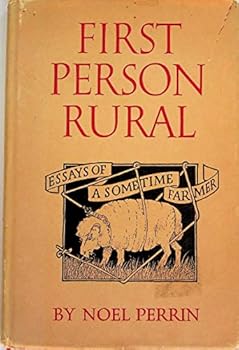First Person Rural: Essays of a Sometime Farmer
Select Format
Select Condition 
Book Overview
These essays, all concerned with countryish things, range from intensely practical to mildly literary. Transplanted from New York fifteen years ago and now a real-life Vermont farmer, Noel Perrin... This description may be from another edition of this product.
Format:Hardcover
Language:English
ISBN:0879232323
ISBN13:9780879232320
Release Date:January 1978
Publisher:David R Godine Pub
Length:124 Pages
Weight:0.80 lbs.
Customer Reviews
3 ratings
Enjoyable and Insightful
Published by Thriftbooks.com User , 18 years ago
In this book, Perrin gives us an honest view of what it's like to be an amateur farmer in Vermont. He is realistic and open enough to share his own foibles. Perrin does not romanticize farming or rural life, even while writing about the richness such living can hold. "First Person Rural" is also full of lots of practical advice for those looking to buy pickup trucks or chainsaws or looking to make maple syrup/maple sugar. A quick but meaningful read.
Peasant Tales
Published by Thriftbooks.com User , 19 years ago
This book is a collection of essays by a man who describes himself by observing "I once was a New Yorker. Now, I'm a peasant." Perrin moved to Vermont some 14 years before writing these essays and had a lot of time in the meantime to learn the ways of the country. He shares with us some practical advice, like how to rescue burned maple syrup, or how to build fences using trees from your own land. In one story featured in this collection, he tries to take a load of firewood to New York City to see how much of a killing he could make by selling it there. Some of the stories are a bit humorous, but mostly, they aim towards the practical. Perrin addresses himself to other newcomers, or wanna-be newcomers to Vermont, the Flatlanders. In comparing city life to the idyllic country lifestyle, he notes that here in the country we don't have garbage strikes (since we don't have garbage pickup or sanitation workers to get disgruntled), but we do have fresh air (which needs to be warmed up from -20 degree temperatures before you can breathe it without pain). One of his themes is the tension between modernization and the determination to make a "last stand" by living a traditional lifestyle. A mainstay of Vermont's tourist economy is the "last stand" farmstead; unfortunately, it's nigh onto impossible to make a living by farming without modern equipment such as milking machines, which goes against the ethos of "last stand". As I read this book, I couldn't help but think of the native Vermonters I've met, who want to have nothing to do with woodstoves or dirt roads. They've split and hauled all too many cords of wood in their time, and now that they have the resources to own a house with a modern furnace located on a paved road, they don't see any reason why they should go backwards. Meanwhile, the Flatlanders come up here and can't wait to get themselves a woodstove, and they can't understand why the natives aren't interested in such things. Flatlanders like the challenge of learning how to do for themselves, to provide their own water, heat and food. Some native Vermonters look on, bemused both at how little common sense the Flatlanders have, not knowing how to do anything right, and also at their determination to do things the hard way when they have the resources to live like modern city people do. But of course, not all Flatlanders or native Vermonters fit the stereotypes-some Flatlanders are quite skillful at country living, and many native Vermonters are quite pleased with to see their new neighbors fit in so well on "last stand" homesteads. In any case, if you're a recent arrival in the country, Perrin's tales may hit a chord with you, and you just might learn something useful along the way.
A fine, though dated, intro. to a rural life in Vermont
Published by Thriftbooks.com User , 24 years ago
I just finished the last half of this book last night. Perrin's book is a droll but always honest take on the country life in his beloved adopted "homeland" of Vermont as he alerts the reader to the realities behind the romantic vision portrayed on various Maple syrup containers. Country life is tough and not for the soft-hearted or timid. Some of the chapters are dated (it was published in 1978), especially the pick-up truck advice. But I did learn a lot from this book as I consider my own move to the hard rural life of Vermont and I was thoroughly entertained the whole way through. It's a really easy read with some great tips if you're thinking of making the move to a more rural life. I'm looking forward to reading Second and Third Person Rural books in the next couple of weeks. I got through this one in 3 days of sporadic reading.





